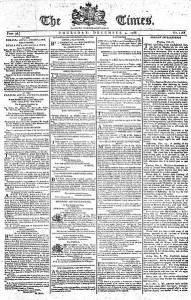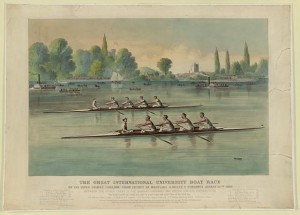Slightly in Favor of CSA
From The New-York Times October 4, 1861:
THE STRENGTH OF THE AMERICAN COMBATANTS.
From the London Times.
We do not build much on the success at Cape Hatteras. It is in its naval force that the Federal Government is strongest, and it was never probable that the Confederates would be able to hold their own at sea. The expedition down the Mississippi is an operation of a more important kind, but its success we should think, is far less certain. It is an expedition in which we may expect to see the inventive genius and the adventurous courage of the Americans fairly illustrated. The banks of the broad river are clothed with thick forests suggesting every variety of ambuscade, and if the invaders have the advantage of equipment the natives will be superior in knowledge of the country and natural resources. Above all, it must be remembered that the main armies of the belligerents are on the Potomac, and that the trial of strength most immediately decisive will take place at that point where the Confederates are still reputed superior. They may forfeit this ascendancy, no doubt, if they assume the offensive and advance against the fortified positions of their enemies; but if, on the other hand, they should obtain any material success in that quarter, the more distant operations of the campaign would be thrown into the shade. All we can see at present is that the North has been making strenuous and successful efforts to convert its numerous levies into good working soldiers, that it possesses vast resources in a brave aud earnest population, and that it is likely to profit by the lessons it has received. What we cannot see is the degree in which this improvement may be counterbalanced by the simultaneous progress of the South. The South is not absolutely so strong as the North, but it has hitherto been stronger in the field, and it will always be strong enough, in all human probability, to resist subjection, if not to enforce its will. That seems to be now almost universally acknowledged as the inevitable condition of the struggle, and it is only to be lamented that so plain a fact should not have suggested the suspension of a profitless and sanguinary strife.
There’s been a lot in The New-York Times about English and French opinion. The part of this piece that caught my attention was the mention of the Mississippi campaign. It seems that the British editors had in mind something like cagey Rebels trapping the federal armies on a bayou or some such thing. However, the first thing I thought of when I read “the inventive genius and the adventurous courage of the Americans …” was Union General Grant’s Vicksburg campaign.
This editorial seems prescient with its ambivalence about the success of a Confederate offensive against the North. And it certainly was a “sanguinary” war. But the South could not quite “resist subjection”.
According to Wikipedia, “During the American Civil War, The Times represented the view of the wealthy classes, favouring the secessionists, but it was not a supporter of slavery.”


